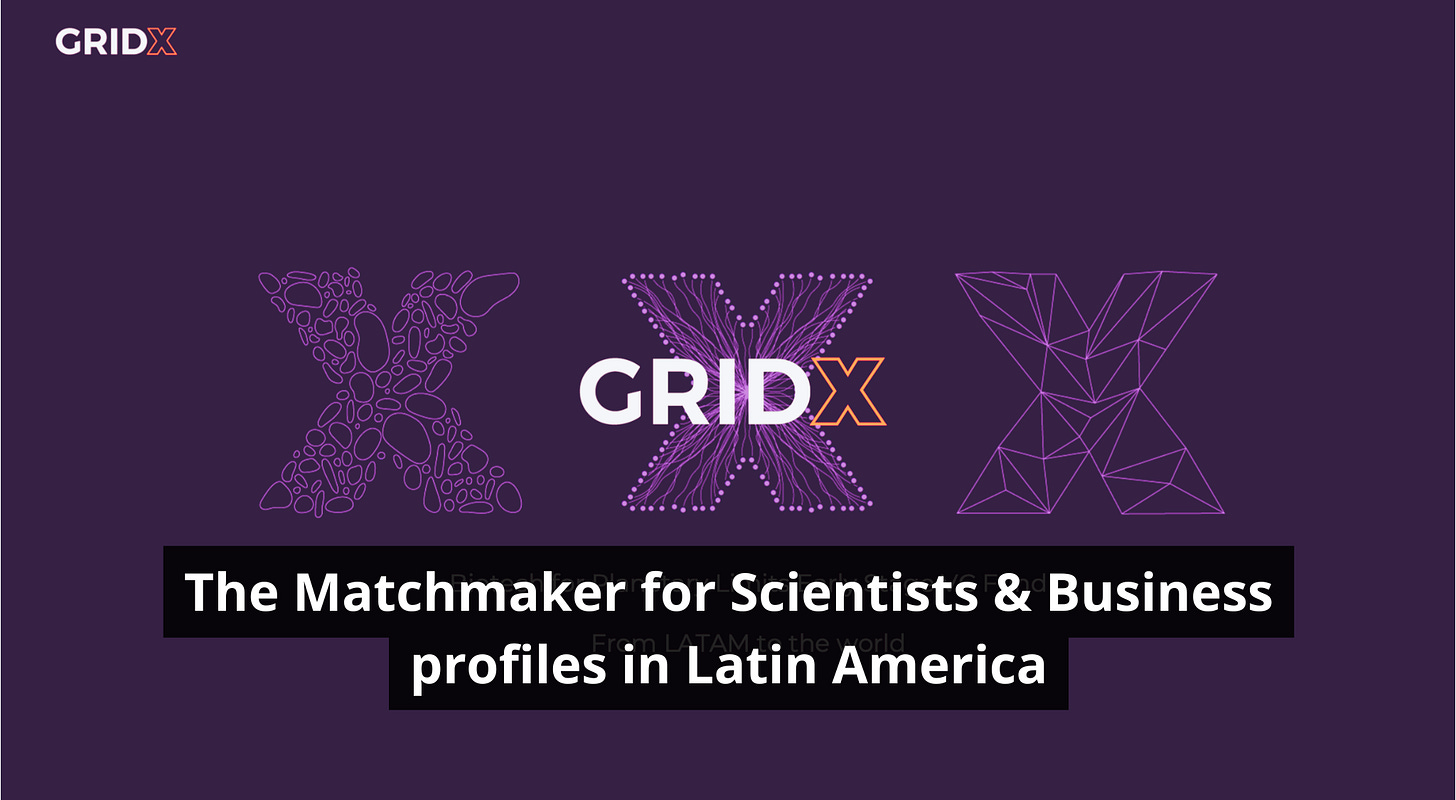Welcome to the Scenius Deep Dive Series. In addition to our weekly roundup of the LATAM startup scene, these editions offer long-form, narrative analyses of emerging startups in Latin America.
Today, I'm exploring GridX, a venture capital fund that has developed a company-builder model transforming Latin American scientific projects into startups with global impact.
To date, GridX has raised US$41.5 million across two funds and manages a portfolio of 81 companies throughout Latin America, with 75% co-founded by women. These companies collectively employ 1,000 people, including 700 scientists.
Let’s dive into the story of GridX.
Do You Have a Moonshot Project?
Ask any entrepreneur about their moonshot project for the future, and most will answer "yes." Unfortunately, few ever get the opportunity to pursue it.
A moonshot project is ambitious, exploratory, and groundbreaking. It involves high risk without any guarantee of near-term profitability or benefit. Betting that Latin America will become a hotbed of future biotechnology? That's what I call a moonshot project!
Matías Peire, co-founder and CEO of GridX, didn't grow up dreaming of disrupting the biotech sector from Latin America. In fact, entrepreneurship wasn't part of his original plan—life had other ideas.
Born and raised in Argentina, Matías began his entrepreneurial journey at age 22 with a university friend. It was 2001, and Argentina was deep in an economic crisis. With jobs scarce, his friend's invitation to launch a company became an unexpected opportunity.
They made an unconventional choice that would later prove crucial: rather than simply using technology to build a business, they decided to develop technology itself, focusing on hardware and software niches.
Over the next decade, Matías immersed himself in building the company, evolving from an accidental entrepreneur into a seasoned business leader.
His first venture, 3Way Solutions, focused on developing video appliances for technical monitoring in the broadcast industry, creating hardware and software for head-ends, cable operators, broadcasters, and content generators.
From this company, he launched a spin-off focused on surveillance appliances called Batten. In 2010, he also founded Tecnologus, a company that applied data science tools to scraped IP information, aiming to provide easier access to IP information for SMEs in emerging countries. Though Tecnologus ultimately failed and closed in 2012, these experiences were crucial to his development.
This early experience gave Matías two crucial advantages that would later prove invaluable to GridX's success: a deep understanding of technical innovation and the ability to work effectively with technical experts. As the only business-focused person in a world of engineers—from his co-founder to employees and clients—he learned to bridge the gap between technical expertise and business strategy.
The Long Game: Committing to a 10+ Year Vision
Time has a way of reconnecting us with our younger selves' aspirations. For Matías, the realization hit that beyond financial success, his twenty-year-old self had dreamed of making a meaningful impact on the world. This epiphany led him to explore his next professional chapter, with venture capital emerging as a promising path.
However, to break into venture capital you either need a strong track record as an investor or must bring a unique investment thesis to the table. With limited investment experience, Matías opted for the latter approach—a decision that led him to discover the untapped potential in biotech.
While Latin America possessed all the ingredients to become a major player in the biotech space, very few projects were being built and financed. Intrigued by this paradox, Matías's research revealed several key strengths of the region:
Latin America boasts excellent universities in science and engineering
Many Latin American scientists complete part of their education at international universities, maintaining valuable global connections
The region's scientists regularly publish in prestigious international journals
The high degree of specialization means Latin American researchers frequently rank among the world's top experts in their specific fields
Very few companies were emerging from this scientific ecosystem
These factors created perfect conditions for potential investment returns, yet the opportunity remained largely invisible to most investors.
Furthermore, while most biotech investment globally concentrated on therapeutics and new molecule discovery, Matías saw untapped potential in a broader spectrum: from agricultural innovations to industrial bioprocesses, environmental solutions, diagnostics, and personalized medicine.
He found validation of his thesis in pioneering funds like IndieBio (based in San Francisco and New York), whose success was already proving the potential of this new biotech category.
Ready to go all-in, Matías drafted a decade-long plan to seize and execute on this opportunity.
He began with an ambitious three-year learning phase, immersing himself in science and the innovation ecosystem. Through conversations with over 500 people—scientists, startup founders, and investors—he uncovered the fundamental challenge: there simply weren't enough startups for traditional venture capital investment in this space.
Rethinking Venture Capital from First Principles
Keep reading with a 7-day free trial
Subscribe to Scenius LATAM to keep reading this post and get 7 days of free access to the full post archives.




